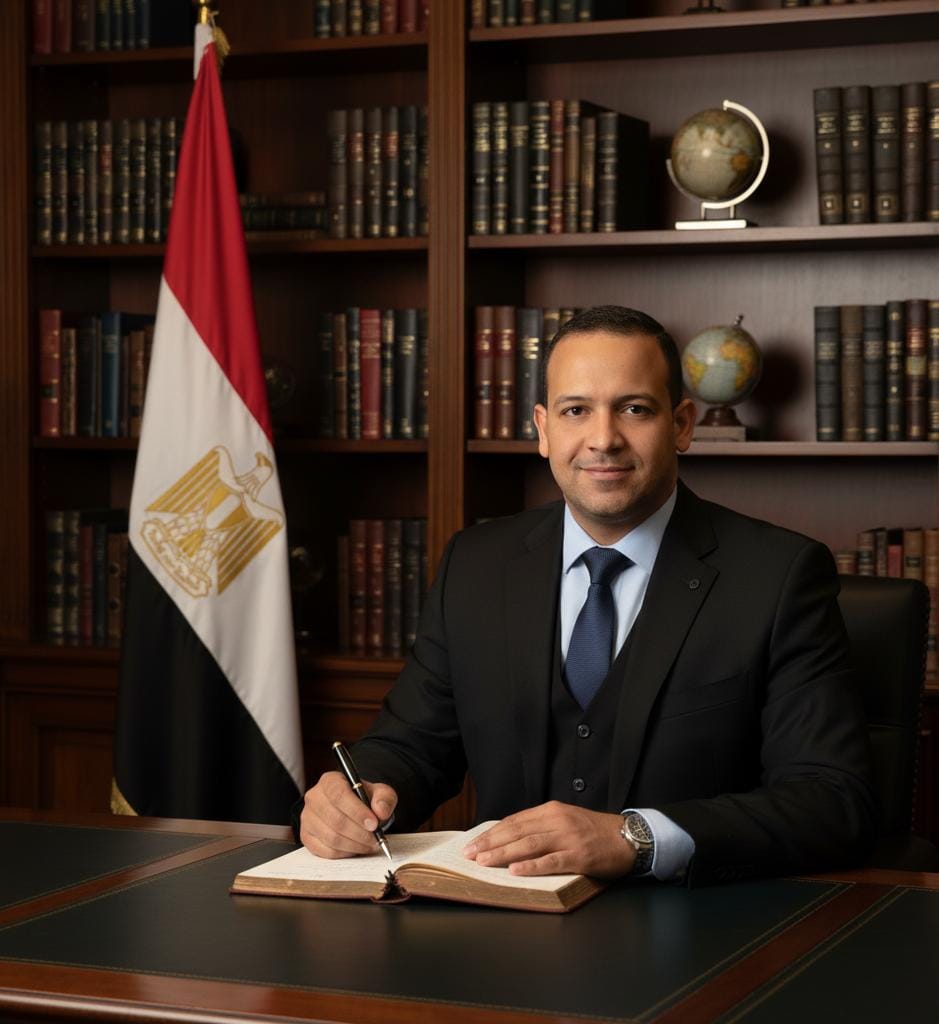By Counselor Hossam Ed-Deen Allam
Founder, Law and Peacebuilding Initiative
Egypt’s current parliamentary elections reflect an important moment of conscious interaction between society and the State. Within this process, citizens express their political agency based on awareness and free choice, assuming an active role in shaping public life. Electoral participation in this sense is anchored in the principle of the rule of law, which places all individuals and institutions within a clear framework of rights and responsibilities, enabling diversity and political competition to unfold through legitimate and peaceful means. As such, elections serve as a principal pathway for national peacebuilding, transforming plural social voices from the margins into the decision-making arena of Parliament and converting public will into legislative authority capable of governing public affairs in a stable and peaceful manner.
The principle of the rule of law forms a cornerstone of Egypt’s constitutional order. Article (94) of the 2014 Constitution stipulates: “The rule of law is the basis of governance in the State. The State is subject to the law…” This provision underscores that democratic legitimacy is grounded in adherence to established legal norms rather than arbitrary authority. It provides elections with an organized legal framework that guarantees equality, transparency, and procedural integrity. Within this logic, elections become a practical expression of societal vitality and the ability of citizens to participate meaningfully in shaping public institutions.
Parliament — the House of Representatives — is the constitutional body vested with legislative and oversight authority. Article (101) states that the House “shall exercise legislative authority, approve the general policy of the State, the general plan for economic and social development, the State’s public budget, and shall exercise oversight over the actions of the executive authority…” By combining law-making with oversight, Parliament functions as a central mediator between the State and society. This ensures policy accountability, protects rights, and preserves institutional balance through constitutional mechanisms anchored in democratic representation.
The oversight function, in particular, is a key guarantee for enforcing the rule of law. Parliamentary instruments — including inquiries, interrogations, and information requests — subject the executive to scrutiny before an elected body. This institutional interaction translates citizens’ electoral choices into tangible public action, ensuring their priorities are reflected in legislative and oversight agendas. Parliament thus becomes the operational link between public will and the implementation of legal norms.
In this context, the National Elections Authority (NEA) plays a pivotal role in safeguarding integrity and transparency throughout the electoral cycle. Its mandate spans the preparation of voter rolls, regulation of candidacy and campaigning, supervision of polling and counting, and formal announcement of results. Article (210) of the Constitution affirms that the NEA is responsible for “administering and supervising referenda and presidential, parliamentary, and local elections.”
Distinctively, the Authority’s leadership is judicial in composition: its governing board consists of senior judges drawn from the Court of Cassation, Courts of Appeal, the State Council, and the State Lawsuits Authority. This judicial structure reflects deep societal and constitutional confidence in the judiciary as a guardian of impartiality and procedural rigor. Judicial supervision extends nationwide, with judges presiding over general and sub-committees at polling stations in every governorate, ensuring strict adherence to legal procedures and reinforcing public trust in electoral integrity. This institutional architecture embeds the rule of law at the heart of political competition and translates constitutional principles into reliable practice.
The electoral process further supports peacebuilding by offering an orderly framework for expressing social and political plurality. Article (5) of the Constitution affirms that the political system is founded on “political pluralism and the peaceful transfer of power…” This reflects an understanding that diversity is to be managed through representation, dialogue, and participation rather than exclusion. Institutions capable of absorbing this diversity — foremost among them Parliament — promote constructive engagement. Differences move into a legal and deliberative space, strengthening stability and reducing the potential for friction.
At a practical level, elections provide an institutional channel that enables individuals to influence public decision-making and help shape policy priorities. When exercised with awareness, participation fosters a shared sense of civic responsibility and enhances trust between society and governmental institutions. Its effects are not merely symbolic; participation contributes to societal stability by ensuring that aspirations and disagreements are addressed within clear legal frameworks. This, in turn, supports broader peacebuilding efforts rooted in long-term institutional resilience.
Article (87) of the Constitution underscores that participation in public life is a national duty, and that every citizen has the right to vote, run for office, and express opinion. This dual formulation highlights that electoral participation embraces both an individual dimension — linked to constitutional rights — and a collective dimension — tied to building institutions capable of effectively representing society. Exercising the right to vote therefore constitutes a foundational step in reinforcing the rule of law and enhancing the State’s ability to respond to societal needs.
Conclusion
A constitutional and legal reading of Egypt’s parliamentary elections indicates that they are not merely procedural events; rather, they are deeply intertwined with the principles of the rule of law and the imperatives of national peacebuilding. Effective participation strengthens the legitimacy of institutions, consolidates accountability, and transforms social plurality into constructive civic energy within a peaceful legal framework. In this sense, voting is a dual-natured act: it is a right that empowers citizens to select their representatives, and a national duty that contributes to the State’s stability, responsiveness, and sustainable development.
